Race
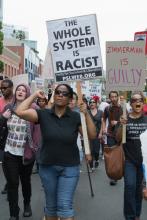
Several years ago, Michael Emerson and Christian Smith criticized the quick-fix approach to racism found in the evangelical race reconciliation movement. They noted that evangelicals tended to address systemic racism through promoting interracial interactions at one-time events such as Promise Keepers rallies. Ironically, this approach tended to increase rather than decrease racism because it gave white evangelicals just enough exposure to people of color to think they now understood race without enough systemic interaction to expose them to the endemic nature of racism. They suggested instead that the preferred response was to engage in political and legal advocacy in order to change the institutional nature of racism. However, what they failed to address in that book is that political and legal approaches to race often suffer from the same quick-fix approach.
Today, we see the same quick-fix dynamics in the outcome of the George Zimmerman trial. Some are focusing again on developing interracial interpersonal relationships, while other evangelical groups have focused on legal advocacy. But in our rush to promote a “solution,” we may end up creating more harm than good. I believe evangelicals have the possibility of addressing racial injustice in a more creative way that could get more closely to the roots of the problem if we took the time to think creatively.
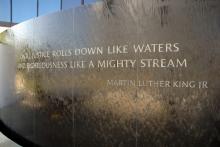
I was born in 1969 and thus am in the first generation of African-Americans to grow up with laws and policies that say to the rest of America that I am equal. I saw housing opportunities open up for me as my parents “broke the block” and became the first African-Americans to move onto an all-white block in the East Mt. Airy section of Philadelphia in 1970. I saw educational opportunities open up such that I was able to attend a nearly all-white private, college-prep high school in the suburbs. This was the fruit of the Civil Rights movement in my life growing up in the 1970s and 80s.
Soon hundreds of thousands will gather on the National Mall to commemorate the 50th anniversary of the March on Washington for Jobs and Freedom where the Rev. Dr. Martin Luther King gave his iconic “I Have a Dream” speech. That speech lived on for me in classrooms and in speech competitions and was etched on my heart so that I would carry that dream into the future.
The recent decisions by the U.S. Supreme Court to gut the enforcement section of the 1965 Voting Rights Act and the decision of the jury in the George Zimmerman trial have left me wondering about the dream, worried that it is under attack and worries that professed Christians are among those helping lead those attacks.

Where do we go from here?
From the denial of racism to the naming and facing of racism.
If we are to move forward, we must acknowledge that racism is alive and well in the American psyche. It continues to function as a demonic force with devastating consequences for us all. To be white in America is to benefit from a system of power and privilege whether or not one has ever uttered a racist thought or committed a racist act.
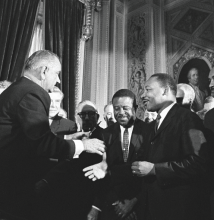
BACK IN THE day, when Stevie Wonder was Wishing “those days could come back once more,” my 6-, 7-, and 8-year-old friends and I had no idea what the heck he was talking about, but we loved the groove and would blast Wonder’s Songs in the Key of Life album from our front steps as we played in front of my house in our West Oak Lane neighborhood of Philadelphia.
Sometimes the boys would coast down the street on handmade skateboards, literally made of old skates—the kind with wheels you strapped to your shoes—nailed to short wooden planks. Sometimes the girls and boys would race each other down a steep street, flying at lightning speed on bikes and boards, to see who could make it first to the candy shop at the bottom of the hill. And sometimes, in all the play, a verbal sparring match would break out:
“You so big,” one friend would say, “it take two showerheads to clean yo big butt in the morning!” Then the 7-year-old sparring partner would come back: “Oh, yeah?! You so ugly, yo mama say ‘What dat?’ when she give birth to you!”
It would keep going and we’d all laugh out loud until someone got inappropriate. Usually inappropriateness began with three words: “Yo mama so ...” We all knew to never bring someone’s mother into the sparring match unless you wanted to fight for real. Those were fighting words.
This summer the Supreme Court got inappropriate. They spewed fighting words on the playground that is our national public square.

It is not very difficult to understand why there is a black church and a white church in America today, or to realize that this structure will not change in the near future. The religious atmosphere created by the coming together of blacks (who were slaves) and whites (who were masters) tended to negate any possibility of developing the true unity and oneness that scripture proclaims for the church. The agendas of the slaves were vastly different from those of the masters. Unfortunately, conflict over agendas, both stated and unstated, continues to be one of the reasons that blacks and whites do not come together to worship.
The battles over immigration reform and race have weighed heavily on me this summer. They have each become a symbol and a test, for me, of whether we can resurrect “the common good” in this nation.
I say that having just met with virtually all the key decision makers on when, how, and even if our nation’s politicians have the capacity to reform our terribly broken immigration system and help heal the nation from all the pain it has caused. Almost two-thirds of the country — both Democrat and Republican — is for reform, but this ideological impasse is now the greatest threat to our 11 million undocumented friends and neighbors in this country. I have met with both Republican and Democrat senators and members of Congress, including their leaders, the president and his leadership team, law enforcement officials, business leaders, and hundreds of pastors and Christians across denominations and backgrounds — all of whom want to repair this deeply flawed and cruel system.
There is so little substance to oppose reform. It’s good for the economy, for law enforcement, for families, communities, and congregations, and for the moral fabric of our nation — as a place of diversity, growth, and welcoming.
You see, politics really isn’t the problem here. Nobody wants to talk about what is at the very heart of the problem: race.
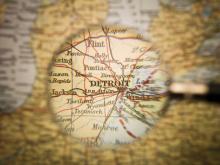
Eventually, Butch invited me to come to his home and meet his family. I felt deeply honored and very eager to go. But every time I asked him to write directions to his place, he would change the subject. Finally one day with pen and paper in hand, I sat him down and said, "Look, Butch, how do you expect me to get to your house if you don't write out directions for me?"
Awkwardly he began to scribble on the paper. I was deeply sad when I realized the reason he had hesitated before was that he could barely write; I was ashamed at my insensitivity.
That small incident was very significant to me. I went home that night and both cried and cursed. I could not believe that someone as bright as Butch had hardly been taught to write. I was furious at a system that had given me so much and him almost nothing, simply by virtue of our skin color. By accident of birth, I had all the benefits and he all the suffering. I vowed again through angry tears to do everything I could to change that system.
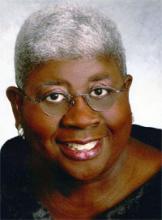
I suppose I could live my life saying, "I will never allow myself to try to understand white people. I will cut myself off from them. I will live my life as a black woman, and I'll just keep white people in boxes." But to do that means to keep myself cut off from a part of myself. And if white people do that about black people, I think the same is true: It keeps them cut off from a part of themselves.
For those of us who are Christians, I don't think we have any choice in the matter. I think God has made it clear that we're to be reconciled to God and each other. And if we're to be reconciled to each other, that includes everyone who happens to be in the world with us.
Reconciliation demands that you not take sides; it demands that you take a stand, I think—a stand that's maybe a merging of a lot of different pieces that represent several different kinds of philosophical stances. I think that one who chooses a road of reconciliation must be willing to look at more than one side of the coin.

WHO ARE WE? WHERE ARE WE GOING? And how are we going to get there? We can no longer answer these questions. Indeed, we have stopped asking them. But just as the future of blacks seemed to be in peril when integration was introduced decades ago, our future as a viable racial and ethnic group in this country will be greatly diminished unless a new model for racial and cultural development is established.
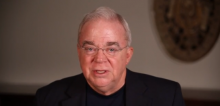
Jim Wallis sat down after the George Zimmerman verdict earlier this month to give his thoughts on race, faith, and truth.
"We live in our different worlds. That's not what we're supposed to do as the body of Christ."
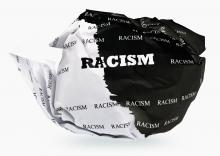
IN SPIRITUAL AND BIBLICAL terms, racism is a perverse sin that cuts to the core of the gospel message. Put simply, racism negates the reason for which Christ died—the reconciling work of the cross. It denies the purpose of the church: to bring together, in Christ, those who have been divided from one another, particularly in the early church's case, Jew and Gentile—a division based on race.
There is only one remedy for such a sin and that is repentance, which, if genuine, will always bear fruit in concrete forms of conversion, changed behavior, and reparation. While the United States may have changed in regard to some of its racial attitudes and allowed some of its black citizens into the middle class, white America has yet to recognize the extent of its racism—that we are and have always been a racist society-—much less to repent of its racial sins.
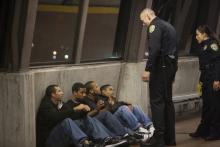
I tend to keep my heart under lock and key. I am not prone to Merton-esque revelations. My conscious mind is a far safer vantage point from which to view life’s experiences, so when a friend invited me to go see the newly released Fruitvale Station last night, I thought that was the perspective from which I would see it: my logical mind, my heart under wraps. It was about a subject with which I have no experience and only vaguely remembered from the papers a few years back. I thought it would be a perfect film for my head to be educated while my heart remained safe. I was wrong.
Fruitvale Station broke my heart open.

A straight-shooting white friend once commented that whenever blacks and whites are together it's like there's a "big pile of poop in the middle of the room" that everybody sees and smells but pretends isn't there.

Suddenly, it seems, white people are seeing the racial divide as looming larger than before. Race, so often dismissed by white people as an insignificant factor in contemporary U.S. society, has acquired meaning—meaning that they were working hard to ignore.

During a layover in the Phoenix airport on Friday, I caught the tail end of President Barack Obama’s remarks about the Trayvon Martin case. Struck by Obama’s words, I said to no one in particular, “It’s about time he said something about this.” The man next to me looked in my direction as I walked to get a snack, and I considered for a second going back and asking his impression of the president’s remarks. I kept walking toward the green licorice, but fate had other plans.
Who ended up being in seat 18B next to me? Yep. We smiled as we made eye contact, a mutual recognition that we had an overdue conversation coming and the time to have it.
For a living, I teach and facilitate dialogue. I train others how to — and why to — have challenging conversations that transform relationships and design community change. I have facilitated more than 10,000 hours of dialogue in the past 15 years.
I was feeling confident and curious. We got right into it.
“Well, looks like we are supposed to talk about it,” I said as he laughed. “What did you think of the president’s remarks?”
“I think I thought differently than you did,” John said

In light of the Zimmerman verdict, it’s taken my all to keep my spirit afloat. Upon the verdict’s announcement, I sat in shock and dismay, perplexed by the outcome. Despite anything revealed through the trail, a few facts remain: Martin, an unarmed teenager was followed and pursued by an armed adult, Zimmerman. Ultimately, Martin was fatally shot by Zimmerman, and Zimmerman’s received no legislative punishment for killing Martin.
Upon awakening from the trance of the verdict, I began crying as I held my four-month old son. I wept because as an African-American male, I’m fully cognizant of how dark brown skin will exacerbate his odds of being profiled and criminalized as Martin was. I am also aware that the neighborhood we reside in, by choice, on account of our faith, also increases his chances of being stereotyped. Nevertheless, irrespective of how stacked the odds are against someone, odds never define a person’s existence. Through God’s grace, communal support, social capital, hard work, and discipline my son can overcome these odds; but I must admit, my faith in this took a blow Saturday.

Oddly, I wasn't there the night George Zimmerman shot Trayvon Martin. I wasn't in the jury box either. Some commentators, like Ezra Klein and Ta-Nahesi Coates, are saying the not guilty verdict was appropriate according to Florida's "stand your ground" law. (Note that they are not saying that the Florida law is appropriate; Klein uses the word outrageous).
If this verdict was appropriate, though, what about verdicts in cases that were similar except for the color of the defendant? What happened to the "stand your ground" law when the jury reached its verdict against Marissa Alexander — an African American woman from Jacksonville, Fla.?
And anyway, why should fear of attack justify shooting to kill? It didn't in the case of John White — an African American man from Long Island, N.Y. — who shot a (white) teenager in 2006 (accidentally, he says, when the boy was trying to grab his gun).
John White, it appears, had good reason to fear the boys who showed up on his doorstep that night. That's probably why the governor commuted his sentence after he had served five months. And White no doubt should have served some time, according to New York law — his gun was unregistered, and if he hadn't been holding it when he went to the door, a scuffle probably wouldn't have escalated into manslaughter.
But, some say, the only thing that stops a bad guy with a gun is a good guy with a gun. Is this true?

Carolyn Winfrey Gillette, a pastor who is a foster mother to a four year-old African American boy, wrote this hymn after George Zimmerman was found not guilty for his shooting of Trayvon Martin. She had read Jim Wallis’ “Lament from a White Father” and heard the Rev. Otis Moss of Chicago's Trinity United Church of Christ interviewed for the NPR report, “For The Boys Who See Themselves In Trayvon Martin.”
We Pray for Youth We Dearly Love
O WALY WALY LM (“Though I May Speak”)
Solo (optional young voice):
“If I should die before I wake,
I pray thee, Lord, my soul to take....
And if I die on violent streets,
I pray thee, Lord, my soul to keep."
(Continued at the jump)
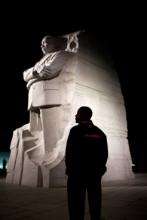
I first learned about President Obama’s comments about racism and the Trayvon Martin case last week when a Facebook friend posted a link with this comment:
“Full text of the American President’s divisive and racist remarks today. He moves smoothly into his new role as race-baiter in chief.”
My friend’s anger was matched by many others from PowerLine to Breitbart. But what I read seems to me as controversial as tomorrow’s sunrise and incendiary as wet newspaper.
Let me try an analogy.
Imagine that Joe Lieberman had been elected our first Jewish president. And that in a moment of crisis, he felt compelled to explain that some reaction to even the hint of anti-Semitism is partly explained by the Jewish cultural memory of the Holocaust. And he included personal anecdotes about growing up Jewish in America.
Would he be accused of being divisive and guilty of whatever the Jewish equivalent of “race-baiting” might be?

THROUGH THE WRITER of the letter to the Hebrews we will be learning this month how the spiritual environment that upholds us as agents of God’s reign is richly, magnificently peopled. Entering into the spirit of this letter is like finding oneself worshiping in a great Byzantine church, in which the walls are blazing with frescoes and mosaics depicting the history of salvation and the saints in all their glorious variety. The writer extols the lineage of witnesses to God down the ages. We are asked to recognize them all as a crowd of supporters cheering us on. The writer insists that we live in vibrant awareness of the great and all-embracing community that God is forging. “But you have come to Mount Zion and to the city of the living God, the heavenly Jerusalem, and to innumerable angels in festal gathering, and to the assembly of the firstborn who are enrolled in heaven, and to God the judge of all, and to the spirits of the righteous made perfect, and to Jesus, the mediator of a new covenant” (Hebrews 12:22-24).
This is the antithesis of the bizarre theory that “religion is what the individual does with his own solitariness,” as the philosopher Alfred North Whitehead claimed. God is communion, as we try to express it in the doctrine of the Trinity. Life is interrelatedness. The baptismal creed of the church commits us to belief in the communion of saints because God recruits us for the struggle to build, sustain, and nurture community-where-God-reigns here on earth, as it is in heaven.